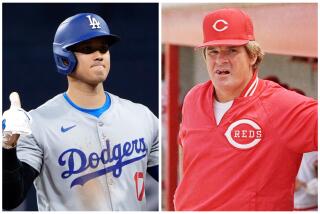Selig Wants Union’s Help
- Share via
Baseball advanced on a stricter steroid policy Friday in the wake of reports that Jason Giambi used steroids for several seasons and Barry Bonds and Gary Sheffield might have taken performance-enhancing substances supplied by a central figure in the federal investigation of the Bay Area Laboratory Co-Operative.
On a day that Bonds’ lawyer, Michael Rains, again denied that Bonds took steroids provided by longtime trainer Greg Anderson, baseball Commissioner Bud Selig called on the Players’ Assn. and its player representatives to tighten a testing program he has said is inadequate.
Selig has asked that the major league policy be reworked to match that employed in the minor leagues. A statement released by the commissioner’s office read, in part, “The use of these substances continues to raise issues regarding the game’s integrity and raises serious concerns about the health and well-being of our players.”
The union and 30 player representatives are scheduled to meet next week.
“I urge the players and their association to emerge from this meeting ready to join me in adopting a new, stronger drug-testing policy ... that will once and for all rid the game of the scourge of illegal drugs.”
The topic gained momentum after the San Francisco Chronicle reported details of federal grand jury hearings in which Giambi, Bonds and Sheffield were asked about taking performance-enhancing drugs, along with their relationships with Anderson and BALCO.
Bonds’ lawyer held a news conference Friday in Oakland, where he backed Bonds’ testimony: that Bonds used substances he was told were flaxseed oil and an arthritis salve, not designer steroids allegedly developed and distributed by BALCO.
“Greg knew what Barry’s demands were. Nothing illegal,” Rains said. “This is Barry’s best friend in the world. Barry trusted him. He trusts him today. He trusts that he never got anything illegal from Greg Anderson.”
Bonds’ agent, Jeff Borris, also issued a statement, which he read to The Times.
“Barry was tested several times this year and the results of those tests were negative,” Borris said. “He puts together statistically one of the most remarkable seasons ever. There are people in this world whose sole purpose is to try and figure out ways on how to undermine the accomplishments of others.”
Negotiations between baseball and the players’ union are ongoing and appear to be focused on the four previous differences in major and minor league testing: substances tested for, frequency of testing, off-season testing and discipline.
The sides appear to agree on the list of banned substances, which will include anabolic steroids, prohormone nutritional supplements, ephedrine, human growth hormone, erythropoietin (EPO) and masking and diuretic agents, and off-season testing.
They continue to negotiate on testing frequency (minor leaguers are tested four times a year) and punishment. Suspensions could be shorter on the major league level, but they are without pay, so they will be costlier.
It is unknown what penalty Giambi will incur, but the New York Yankees are expected to explore the possibility of voiding the final four years of Giambi’s seven-year, $120-million contract. According to Giambi’s testimony, as reported by the Chronicle, he used steroids for at least three years, but cycled off the drug before the 2004 season.
Those three years came in a transition period for baseball. There was no policy in 2002. The game banned steroids and instituted survey testing in 2003, and began its discipline program in 2004.
Meanwhile, the trickle of documents leaked to the public became a downpour this week.
Grand jury testimony from Giambi, Bonds and Sheffield was published over two feverish days. While Giambi reportedly admitted steroid use, Bonds and Sheffield reportedly suggested that if they used performance-enhancing substances, they had been duped into it.
On Friday, testimonies reported by the Chronicle from Bonds, the seven-time most valuable player who is nearing baseball’s all-time home run record, and Sheffield were similar.
Bonds, who passed the 700-home run barrier last season, told the grand jury he’d accepted two substances from Anderson -- one he took orally and the other he rubbed onto his skin -- and took them because, he said, he trusted Anderson.
Investigators allege the Burlingame, Calif.-based BALCO’s line of designer steroids include a drug called “the clear,” or THG, and another called “the cream.”
In a Dec. 4, 2003, hearing, prosecutors questioned Bonds about documents obtained during the investigation they believed might have detailed his use of an assortment of drugs, including human growth hormone, from 2001 to ’03. The documents also contained details of a laboratory test said to reveal a raised level of testosterone in Bonds.
Bonds told prosecutors he could not explain why his name was on the seized documents, but defended Anderson, his longtime friend and trainer.
“Greg and I are friends,” he reportedly said. “I never paid Greg for anything. ... You’re going to bring up documents and more documents. I have never seen anything written by Greg Anderson on a piece of paper.”
He said he did not believe Anderson had misrepresented the drugs, because Anderson “wouldn’t jeopardize our relationship.”
Bonds, according to the reported testimony, never asked Anderson about the supplements, even after Anderson became embroiled in the BALCO scandal.
“When he said it was flaxseed oil, I just said, ‘Whatever,’ ” Bonds said. “It was in the ballpark ... in front of everybody. I mean, all the reporters, my teammates, I mean, they all saw it. I didn’t hide it.”
Giambi and Sheffield also appeared to trust Anderson, in part because of their esteem for Bonds and his training methods. Giambi, the 2000 American League MVP with Oakland, met Anderson after the 2002 season.
“So I started to ask him, ‘Hey, what are the things you’re doing with Barry?’ ” Giambi testified, according to the Chronicle. “He’s an incredible player. I want to still be able to work out at that age and keep playing.”
Giambi told prosecutors Anderson gave him testosterone he injected into his buttocks.
When Anderson provided Sheffield with two substances -- one clear that he took orally and the other a cream -- Sheffield, according to his testimony, took them on Bonds’ advice.
“That’s when I asked Barry, you know, about this guy Greg Anderson,” Sheffield told the grand jury. “And he goes, you know, ‘Don’t ask any questions, just trust me, you know, you’re going to be OK.’ ”
In October, the Chronicle reported it had obtained a secretly recorded conversation in which Anderson revealed Bonds had used an “undetectable” performance-enhancing drug in 2003.
“The whole thing is, everything that I’ve been doing at this point, it’s all undetectable,” Anderson allegedly said. “See, the stuff I have, we created it, and you can’t buy it anywhere else, can’t get it anywhere else, but you can take it the day of [the test], pee, and it comes up perfect.”
Bonds testified he paid Anderson $15,000 for his work as a personal trainer in 2003.
When asked why he hadn’t given him more, Bonds said, “One, I’m black, and I’m keeping my money. And there’s not too many rich black people in this world. There’s more wealthy Asian people and Caucasian and white. And I ain’t giving my money up.”
*
(BEGIN TEXT OF INFOBOX)
How They Test
Drug policies for various sports:
MAJOR LEAGUE BASEBALL
* All players subject to testing for illegal steroids and all suspensions are without pay.
First positive: Player enters a certified treatment program.
Second positive: 15-day suspension or up to a $10,000 fine.
Third positive: 25-day suspension or up to a $25,000 fine.
Fourth positive: 50-day suspension or up to a $50,000 fine.
Fifth positive: One-year suspension or up to a $100,000 fine.
* The possession, sale or use of any illegal drug or controlled substance by players and personnel is subject to disciplinary action by the commissioner or individual clubs.
NBA
* Rookies are tested up to four times a season, and veterans are subject to one random test during training camp. Prohibited substances include amphetamines, cocaine, LSD, opiates, PCP, marijuana and steroids. Penalties range from game suspensions to lifetime bans.
NFL
* Steroid use is banned. Players are randomly tested and those testing positive could face game suspensions and fines.
NHL
* There is no mandatory drug-testing policy. The only drug testing that is done is for players who are already in the league’s substance abuse aftercare program. Players who are abusers can seek help the first time without being exposed or suspended.
NCAA
* Athletes are randomly tested at NCAA championship events and football bowl games. Banned substances include cocaine, amphetamines, ephedrine, anabolic steroids, diuretics, heroin, marijuana, peptide hormones and urine manipulators. Athletes who test positive for any banned substance are ruled ineligible by their schools for at least 365 days and lose one year of eligibility.
BOXING
* Varies by state, though most don’t test boxers. Nevada began testing boxers last year for illegal steroids, and urine samples are checked for 25 different steroids
OLYMPICS
* All U.S. athletes tested within 120 days of opening ceremonies. If two successive samples test positive for banned substances, a U.S. panel reviews the results and issues sanctions or refers the case to a North American or international panel, which can issue sanctions ranging from a warning to a lifetime ban.
Sources: Times sources; Associated Press
More to Read
Go beyond the scoreboard
Get the latest on L.A.'s teams in the daily Sports Report newsletter.
You may occasionally receive promotional content from the Los Angeles Times.










